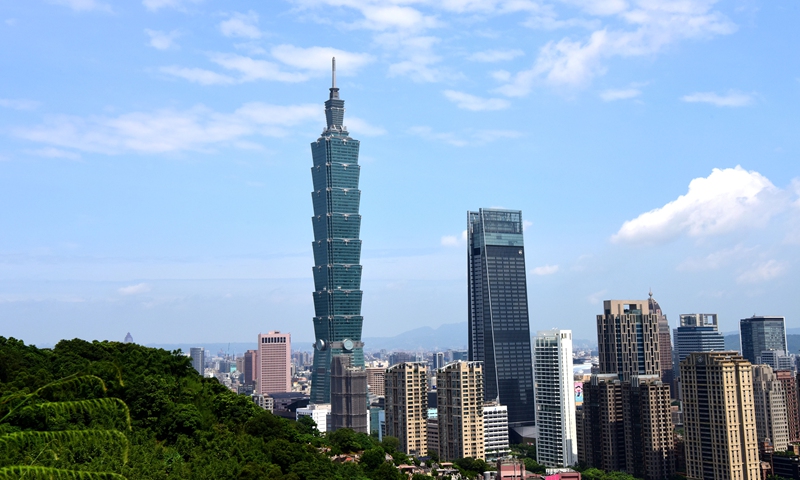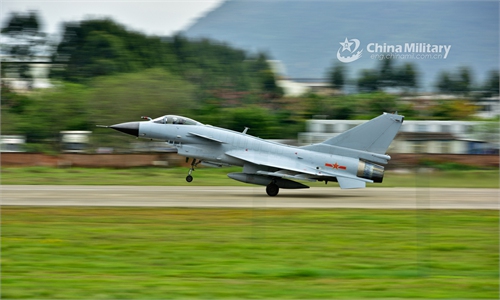Azar-Tsai meeting symbolic, 'meant to provoke Beijing'
PLA fighter jets cross 'middle line' in warning to Taiwan secessionists

Photo:Xinhua
US health secretary Alex Azar and Taiwan leader Tsai Ing-wen's meeting on Monday carry more symbolic weight than actual substance and was simply a manifest of Washington's political agenda of using the island to provoke Beijing, Chinese analysts commented. In a response to the meeting which broke the diplomatic bottom line of China-US relations, People's Liberation Army Air Force reportedly deployed warplanes including J-11 fighter jets in a flight operation across the "middle line" of the Taiwan Straits.Azar met with Tsai on Monday, during which he praised the Taiwan island's success on health in combating COVID-19, and cooperating with the US to respond to health threats. He also conveyed a message of strong support and friendship from US President Donald Trump to the island. Tsai told Azar his visit was "a huge step forward in anti-pandemic collaborations," and she expects the two sides to make progress together, including on vaccine and drug research and production.
Following the meeting, the American Institute in Taiwan and the Taipei Economic and Cultural Representative Office in the US signed a Memorandum of Understanding (MOU) on health cooperation.
Chinese Foreign Ministry Spokesperson Zhao Lijian said on Monday that China has filed solemn representations to the US over the meeting, as the US seriously broke its promises on the Taiwan question, and urged the US to stop conducting official exchanges with the island in any form.
Chinese analysts believe the visit, under the guise of public health cooperation, was a political move of the Trump administration to use the Taiwan card to divert public attention from its failed COVID-19 response and poor approval ratings.
Yang Lixian, a research fellow at the Beijing-based Research Center of Cross-Straits Relations, told the Global Times on Monday that Taiwan is the biggest card of the US in confronting the Chinese mainland, and the detailed arrangement of the visit, including the meeting with Tsai, was nonsense.
"As a health secretary, Azar traveled all the way to the island to talk about a COVID-19 response, when the US has failed in its fight against the disease. What makes you eligible to judge others' response?" Yang asked.
The MOU on health cooperation was nothing significant, as the two have signed similar deals, and no one in the island pays attention, given that the US is such a dwarf in the COVID-19 response, Chen I-hsin, honorary professor at Taiwan's Tamkang University, told the Global Times on Monday.
"The visit, which was previously boasted by media with many 'firsts and high level,' has turned into a joke. Azar himself turned his so-called 'highest-level visit' into a laughing stock thanks to his mispronunciation," Chen said.
Azar reportedly mispronounced Tsai as Xi in his speech while meeting with Tsai, which sparked a protest from some politicians in the island.
Many Taiwan media outlets reported the incident, and said the Kuomintang (KMT) called the Taiwan authority to lodge a protest with the US.
Yang said that Tsai is aware that Taiwan is only a pawn of the US, and the US will not send troops to fight for the island if a war breaks out in the region, and that she dares not cross the red line.
Analysts said the Trump administration will make the most of the Taiwan card before November's presidential elections to gain more support from conservative voters with sinophobia, and will likely upgrade its relations with the island by sending more officials from sensitive departments.
On Monday, J-11 and J-10 fighter jets attached to the PLA Air Force crossed the "middle line" of the Taiwan Straits at around 9 am, an hour before Azar's meeting with Tsai Ing-wen, Taiwan media reported.
Xu Guangyu, a senior adviser to the China Arms Control and Disarmament Association, told the Global Times on Monday that Azar's Taiwan visit broke the bottom line, and the US is attempting to sound out the Chinese mainland's reaction. If the mainland response was weak, it will continue to provoke even further.
The PLA warplanes' operation sends the US and Taiwan secessionists a warning, which shows the Chinese mainland will not swallow the insult and let them do whatever they want, Xu said.
Xu noted that the PLA operation is a very rational one, and more responses in other fields like diplomacy should follow. If the US goes further, the PLA could take more countermeasures, including live-fire missile drills east of Taiwan island and near Guam, Xu said.



